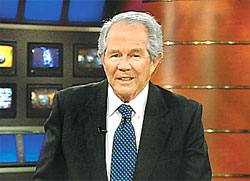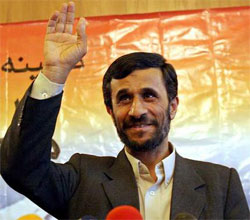
|
Who Speaks for God?
For Sunday February 1, 2009
Lectionary
Readings (Revised Common Lectionary, Year B)
Deuteronomy 18:15–20
Psalm 111
1 Corinthians 8:1–13
Mark 1:21–28
 |
Pat Robertson. |
Who speaks for God?
How can you know?
Sometimes it feels like God is silent, as if he was speechless and not saying anything at all. The psalmists lament their unanswered prayers, and sometimes portray God as unable or unwilling to talk. During a period of political anarchy in Israel's history, when "every person did what was right in his own eyes" (Judges 17:6 = 21:25), we read that "in those days the word of the Lord was rare; there were not many visions" (1 Samuel 3:1).
At other times, the problem is not a deficit of god-talk but a surplus. Plenty of people are eager to speak for God and confident that they know the divine mind. The television evangelist Pat Robertson once claimed that God caused Ariel Sharon's massive stroke as punishment for conceding land to the Palestinians (The 700 Club, January 5, 10, 2006). Or think about your group Bible study, when someone claims, "God spoke to me last night and said. . . " One thing's for sure — earnestness and sincerity are poor criteria to determine who speaks for God.
Some god-talk is ludicrous. One night in the wee hours of the morning a friend of mine couldn't sleep, so he got up and turned on the television. While he was channel surfing he saw a preacher "heal" an extremely large woman. As he pressed the palm of his hand to her forehead she collapsed backwards into the waiting arms of his assistant — only to have her wig snagged off when it brushed the buttons on his blazer.
Other god-talk is not only idiotic but toxic, as when Iran's president Mahmoud Ahmadinejad or Lebanon's "party of God" (Hezbollah) calls for the removal of Israel from the earth. Some god-talkers claim that America enjoys an exceptional place in God's heart. Bruce Wilkinson's book The Prayer of Jabez makes false promises ("You can have a front row seat in a life of miracles."). Most disturbing are the confident declarations made by influential Christians like Robertson, Jerry Falwell, who scape-goated gays and feminists for the 9-11 attack, or Franklin Graham (Billy's son), who advised the use of nuclear weapons against Muslim countries. Pronouncements like these do harm to the Gospel, to believers, to your neighbor, and, given the unfortunate scope of their influence, to the whole world.
And so an important question arose in ancient Israel: "How can we know when a message has been spoken by the Lord?" (Deuteronomy 18:21).
For beginners, Israel was to categorically reject the "detestable ways" of pagan nations. "Let no one be found among you who sacrifices his son or daughter in the fire, who practices divination or sorcery, interprets omens, engages in witchcraft, or casts spells, or who is a medium or spiritist or who consults the dead" (Deuteronomy 18:10–11). It would be an interesting exercise to identify our modern equivalents to these ancient practices of speaking for God. Who are our contemporary "soothsayers?"
 |
Mahmoud Ahmadinejad. |
Instead of these "detestable practices," God promised to raise up a prophet like Moses. "You must listen to him" (18:15). At the simplest level, there arose in Israel the office and function of the prophets; their job was not so much to fore-tell the future as to forth-tell the present from God's perspective. But even within Israel some prophets imitated the soothsaying they were supposed to prevent. Jeremiah, for example, thundered againt the "reckless lies and false hopes" prophesied by Israel's religious leaders (Jeremiah 23:23–29).
Presumption remains the besetting temptation of those who claim to speak for God (Deut. 18:20, 22). People who speak truly for God do so with an acute sense of the audacity of what they are attempting. They sense the presumption inherent in claiming to speak for God. Who in their right mind would make such claims given the combination of human frailty and divine inscrutability? Every sane preacher has experienced the dread and adrenaline shock of the preposterous task — in some stumbling and bumbling way to speak a word that is true to God.
This "holy hesitancy" is well-founded; in Deuteronomy the penalty for false prophecy was death (18:20). That's a sobering reminder for those who speak of God so readily and glibly. In the epistle for this week Paul warns believers who were overly confident about their Christian knowledge: "The person who thinks he knows something does not yet know as he ought to know" (1 Corinthians 8:2).
Whereas some ministries promote personality cults, simplistic formulas, and authoritarian appeals, the desert monastics of the fourth and fifth centuries actively shunned clerical responsibility. They were decidedly reluctant to speak and act for God. John Cassian (c. 360–c. 435) judged it a trick of the devil to "inveigle us into desiring the holy clerical office under the pretext of edifying many." Evagrius (c. 345–399) described clerical aspiration as "the source and root of the love of power."
When a saint asked Abba Theodore, "Speak a word to me for I am perishing," the old man replied sorrowfully, "I myself am in danger. So what can I say to you?" For these early ascetics, renunciation, obedience, and confession of thoughts to an elder were a necessary check on trusting your own judgment — "of all evil suggestions, the most terrible" (Isidore the Priest). Uncritical acceptance of your own ideas, impulses, and inclinations was a sure sign of spirituality run amuck. They were especially dubious of over zealous piety that expressed itself in what Cassian called "immoderate and inappropriate fasting or severe vigils or inordinate praying or excessive reading."
Paul insisted that concrete deeds of love accompany claims of divine knowledge: "Knowledge puffs up, but love builds up" (1 Corinthians 8:1). In Mark we read that people were "amazed" at Jesus's authority and his "new teaching." In marked contrast to how the religious establishment operated, Jesus exemplified an authority that authenticated itself by fostering human healing and wholeness (Mark 1:21–28). Cassian called this "integral wholeness," and we wish it not only for ourselves but for every human being.
Here too the ruthless realism of the monastics can save us from foolishness that masquerades as wisdom. Those grizzled monks experienced every sort of pompous pronouncement, spiritual fraud and pious pretense. They knew what it meant for a deluded believer to be "deceived by his innumerable revelations and [wrongly] believe that he was a messenger of righteousness." Their antennae were especially sensitive to what Cassian called "specious authority" and loveless judgmentalism.
Rather, they counseled an unqualified compassion toward human weakness, a consideration for frailty, and heartfelt empathy for those who struggle. Christians truly close to the heart of God "never frighten with bleak despair those who are in trouble or unsettle them with harsh words." They gladly, fully, and freely proclaimed that God alone was "the gracious arbiter of hidden strength and human infirmity." They looked "with a kind of overwhelming wonder at his ineffable gentleness." So should we.
 |
Mother Teresa. |
I've made my share of stupid remarks. Thank God I was not on television, nor did I command an audience of millions. My poor judgment on those occasions has reinforced my beliefs about the necessity of theological modesty, and the primacy of love. I do believe that God speaks today, but given the cacophony of voices ranging from the goofy to the godly, hearing what He says demands that we distinguish between what engineers call the signal to noise ratio.
For further reflection:
* Do you feel that God has ever spoken to you? When and how?
* How do you feel when others make this claim? Why?
* In your opinion who today speaks truly for God? What distinguishes them?
* See Charles Kimball, When Religion Becomes Evil; Five Warning Signs.
Image credits: (1) www.rotten.com; (2) The Sydney Morning Herald; and (3) CreativeProcess.net.





